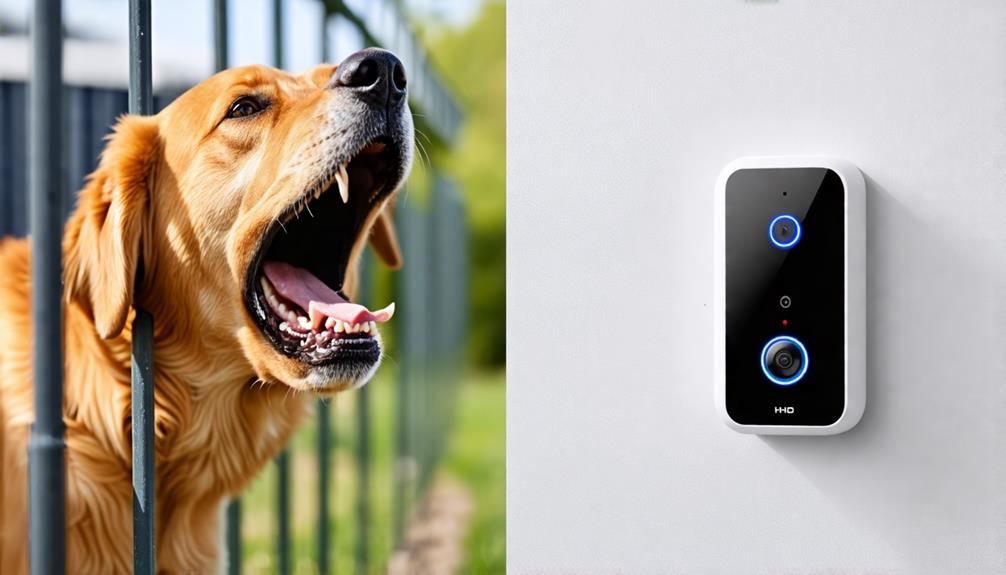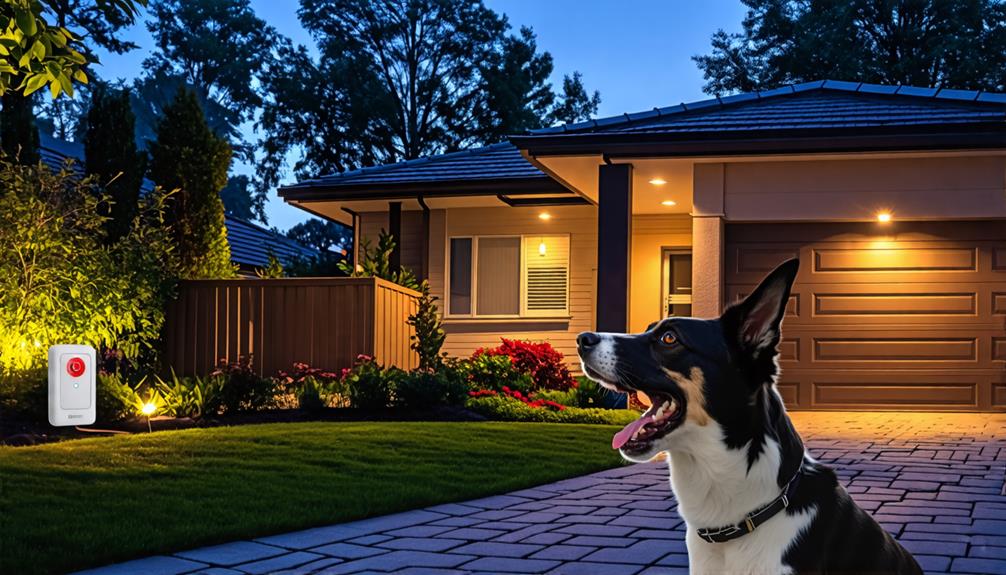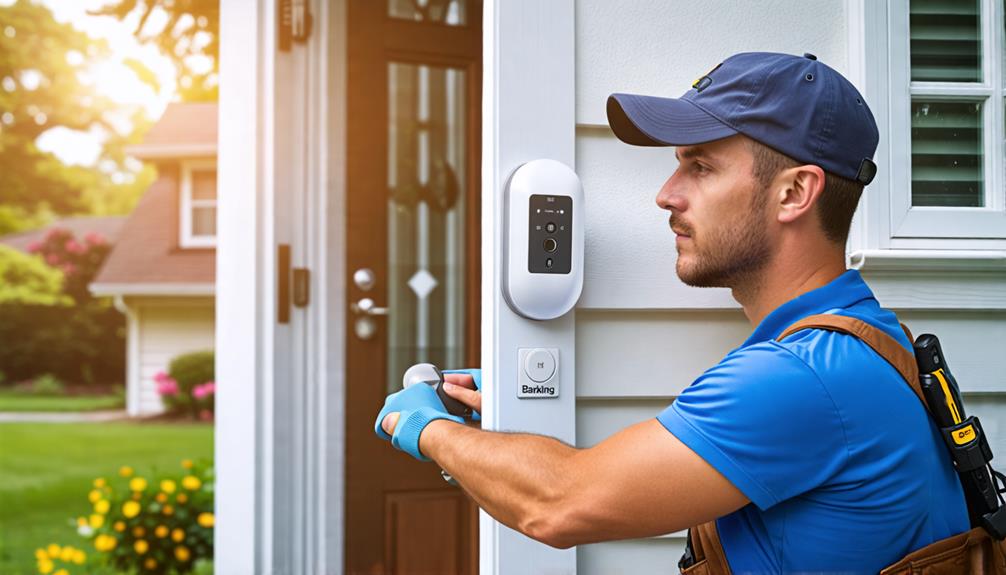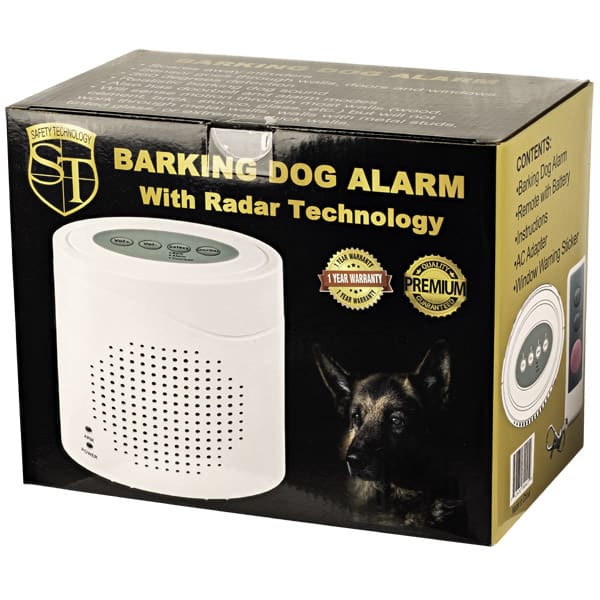
Brainstorm Security Shop

For Orders Over $199

On Any Of Our Products

Details On Refund Page
Have you ever considered beefing up your home security with a barking dog alarm for your back door? This ingenious device mimics the sound of a barking dog, a natural deterrent to would-be intruders, whenever it senses motion. It’s simple to set up and can be customized to suit your specific needs. But how does it really stack up against traditional alarms or more modern security systems? Let’s explore the pros and cons, and you might find yourself surprised at the efficacy and versatility of this lesser-known security tool.
While many security systems are available, barking dog alarms stand out for their unique approach to deter intruders. You might wonder how they work and whether they’re a good fit for your home. Essentially, these alarms use advanced sensor technology to detect movement around your property. When activated, they emit sounds that mimic a real dog’s bark, creating the illusion that a protective pet is on guard.
Unlike standard alarms that simply blare a siren, barking dog alarms tap into the psychological deterrent of having a dog. Intruders often think twice before entering a property guarded by what sounds like a fierce canine. The technology behind these systems is quite sophisticated, ensuring that the barking is realistic enough to fool even the savvy trespasser.
You don’t need to own a pet, nor do you need any pet training to operate these alarms. They’re designed for ease of use: just set up the sensors around the areas you want to monitor—like your back door—and let the system do its work.
Whether you’re home or away, you can rest a bit easier knowing your faux furry friend is on duty.

You’ll find that a barking dog alarm enhances your home’s security by simulating the presence of a protective dog.
It deters potential intruders with its realistic bark, making them think twice before approaching your back door.
Plus, it’s a low-maintenance solution that doesn’t require the care a real dog would.
A barking dog alarm significantly boosts your home’s security by simulating the presence of a protective pet. This innovative device uses recordings of real dog behavior, triggering auditory signals that mimic a barking dog when someone approaches your back door. It’s like having a vigilant guard dog without the responsibilities of pet care.
Integrating this device with your existing security systems enhances your home defense seamlessly. You can connect it to motion sensors or CCTV cameras, ensuring that the alarm activates precisely when needed. It’s a smart addition, especially if you’re not keen on the complexities of more traditional security setups.
Using a barking dog alarm, you’re not just deterring potential intruders; you’re creating an environment that feels secure and monitored. This psychological comfort is invaluable, particularly when you’re away from home or resting at night.
You’ll find that this simple yet effective system gives you peace of mind, knowing that your property sounds and feels occupied, even when it’s not.

One of the primary benefits of a barking dog alarm is its ability to deter potential intruders effectively. Imagine you’re an intruder, lurking near a home’s back door, and suddenly you hear aggressive barking. It’s not just noise; it’s a clear signal that someone’s watching. This scenario taps directly into intruder psychology. The perceived presence of a protective dog heightens the risk for any intruder, pushing them to reconsider their actions.
Furthermore, a barking dog alarm complements your neighborhood watch efforts. While you’re relying on your neighbors to keep an eye out, the alarm adds an extra layer of deterrence. Intruders knowing that homes are both actively monitored and equipped with such alarms might think twice before targeting your community.
It’s about creating an environment where potential criminals feel exposed and vulnerable. You’ll find that integrating this tool into your home security setup not only bolsters your defenses but also fosters a sense of community vigilance.
Everyone benefits when neighbors collaborate in safeguarding their area, and a barking dog alarm acts as a perfect ally in this collective effort. So, you’re not just protecting your home; you’re contributing to the broader security of your neighborhood.
Maintaining traditional security systems often requires significant effort and ongoing expenses, but barking dog alarms offer a hassle-free alternative.
These systems are cost-effective options that you’ll find easy to set up and even easier to maintain. Unlike more complex security setups, you won’t be bogged down by constant updates or the need for technical support. This means less worry for you and more time enjoying peace of mind.
The benefits of opting for this user-friendly system are significant.
Here’s a quick look at what you can expect:
You might wonder how barking dog alarms can effectively guard your back door.
They’re triggered by motion sensors that detect movement near the door, setting off a variety of realistic barking sounds.
This variability in sound aims to better mimic a real dog’s response to an intruder.
Barking dog alarms utilize advanced sensors to detect motion or vibrations near your back door, instantly triggering a realistic barking sound.
These alarms are designed to keep you safe by alerting you of any potential intruders with a loud, canine warning.
Let’s dive deeper into how these mechanisms actually work, focusing on the sensor types and activation methods.
The core of the barking dog alarm is its sensors, which are tuned to recognize specific types of disturbances around your property.
Here’s a breakdown of the main components:
Each type of sensor contributes to a robust security system, ensuring that you’re alerted at the first sign of intrusion.
You’re better protected with these tailored activation methods, making it harder for unwanted visitors to catch you off guard.
Advanced barking dog alarms offer customizable sound features to enhance security effectively.
You’ll find that these alarms aren’t just static noise machines; they’re equipped with sophisticated sound recognition technology. This allows the system to vary its response based on the nature of the threat or disturbance detected. Whether it’s a mild disturbance or a potential intruder, the alarm adjusts its sound accordingly.
The core of these systems lies in their ability to employ frequency modulation. This means you’re not stuck with a single, repetitive bark sound. Instead, the alarm can switch between different tones and volumes, making the alert seem more realistic and immediate.
Frequency modulation helps in deterring intruders more effectively because the varied sounds can mimic a real dog’s response to threats—ranging from low growls to frantic barking based on the level of perceived threat.

Often, homeowners seek reliable security solutions that alert them to any unwanted activity near their back doors. If you’re in this group, you’ve probably heard about barking dog alarms, which can be a game-changer for your home security.
Knowing which models stand out based on user reviews and the reputation of top brands can guide you to make the best choice.
Here’s a quick look at some top models on the market:
Each model brings something unique to the table, and you’ll find that user feedback often highlights reliability and effectiveness.
Check out detailed reviews to decide which device meets your specific needs and preferences.
How do you ensure your new barking dog alarm is installed correctly? It’s crucial to focus on wiring considerations and placement strategies. Here’s a straightforward guide to get you started.
First, identify the best spot for your alarm. You’ll need a location that allows the alarm to cover the entire doorway without obstructions. High corners near the back door often provide the best coverage and minimize damage risks.
When it comes to wiring, ensure that any cables are securely fastened and hidden to prevent tampering. If you’re not confident with electrical setups, it’s wise to hire a professional to handle the wiring.
Here’s a quick reference table to help you with the essential steps:
| Step | Details |
|---|---|
| 1. Choose Location | Ensure unobstructed view of the door |
| 2. Install Bracket | Mount high to avoid easy tampering |
| 3. Wire Connection | Secure and conceal wires |
| 4. Test Alarm | Verify range and responsiveness |
| 5. Adjust Settings | Optimize sensitivity and alarm volume |
Regular maintenance and prompt troubleshooting can significantly extend the life of your barking dog alarm.
Keeping your device in top shape isn’t just about reacting to problems; it’s about preventing them. Here’s how you can stay ahead:
Troubleshooting is just as critical. If your alarm starts acting up, don’t panic.
Check if the batteries need replacing or if the sensors are blocked. Often, simple fixes can save you a lot of hassle.

Yes, you can integrate barking dog alarms with smart home systems, but you might face some alarm integration challenges.
Ensuring smart home compatibility requires selecting alarms that can connect seamlessly with your existing system.
You’ll need to check if both the alarm and your smart home platform support standard communication protocols like Wi-Fi, Z-Wave, or Zigbee.
Proper setup and possibly additional tools or apps might be necessary to achieve full integration.
If you’re worried about how noise affects your pets, it’s essential to consider potential impacts on dog behavior and pet anxiety.
Loud sounds, especially those mimicking barking, can confuse or stress animals not used to such disturbances. You might notice changes in your pets’ behavior or signs of anxiety.
It’s best to monitor their reactions closely and adjust your home environment to help keep them calm and comfortable.
You might wonder if noise-based deterrents are effective against wildlife.
Well, animals typically show high noise sensitivity, making such alarms pretty useful. They’re designed to mimic a real dog’s barking, which naturally scares off many wild intruders trying to sneak around your area.

You’re likely wondering how long a barking dog alarm will last. Typically, these devices have a lifespan influenced by their sensor technology and battery life.
With regular use, you can expect them to function effectively for about 3-5 years. To maximize longevity, it’s crucial to maintain the sensors and replace the batteries as needed.
Always choose high-quality batteries and handle the device with care to ensure it remains in good working condition.
Yes, you can adjust the volume of the barking.
Most models come with volume control, allowing you to set it at a level that’s effective but not overly disruptive.
You’ll also find options to tweak sound variations, so it doesn’t always sound exactly the same.
This flexibility can be really useful, especially if you’re trying to deter potential intruders without disturbing your neighbors too much.
Always check the specific features of your model.
Now that you’re familiar with barking dog alarms, you can see how they boost your home’s security. They’re easy to set up and maintain, ensuring you’re protected whether you’re home or away. Choose a model that fits your needs and enjoy the peace of mind it brings. Remember to check its performance regularly and adjust settings as needed. Don’t wait—enhance your home’s defense and keep potential intruders at bay with a reliable barking dog alarm.

Brainstorm Security Shop
1867 Caravan Trail
Ste 105
Jacksonville, FL 32216
Call us toll free: (800) 859-5566